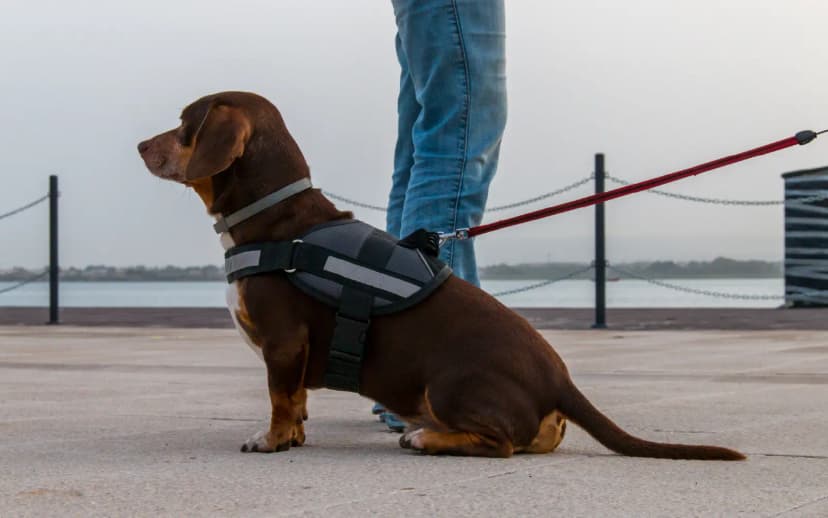Service Dog Laws and Rights in New Hampshire

Service dogs play a vital role in the lives of people with disabilities, offering not just companionship but also critical support in navigating daily life. In New Hampshire, both federal and state laws exist to ensure individuals with service dogs can live, work, and travel without facing discrimination. This guide provides a detailed overview of service dog laws and rights in New Hampshire, equipping you with the knowledge needed to understand and assert your rights.
1. Definition of a Service Dog in New Hampshire
In New Hampshire, the legal definition of a service dog aligns closely with the federal definition outlined in the Americans with Disabilities Act (ADA). A service dog is defined as a dog that is individually trained to perform tasks or do work for a person with a disability. These tasks must be directly related to the person’s disability and may include:
• Guiding individuals who are blind
• Alerting individuals who are deaf
• Pulling a wheelchair
• Assisting during seizures
• Providing psychiatric support such as interrupting harmful behaviors or grounding during anxiety attacks
It is important to note that emotional support animals (ESAs), comfort animals, and therapy dogs do not qualify as service animals under the ADA or New Hampshire law. These animals, although beneficial to their handlers, are not trained to perform specific tasks and therefore do not have the same legal protections in public places.
2. Federal Protections That Apply in New Hampshire
Service dog handlers in New Hampshire benefit from several key federal laws:
Americans with Disabilities Act (ADA): This civil rights law ensures that individuals with disabilities have equal access to public places. Under the ADA, service dogs are allowed in restaurants, stores, hotels, hospitals, and all other public accommodations.
Fair Housing Act (FHA): This law protects people with disabilities from housing discrimination. Under the FHA, landlords must make reasonable accommodations for tenants who use service dogs, even in buildings with a “no pets” policy.
Air Carrier Access Act (ACAA): The ACAA ensures that individuals with disabilities can fly with their service dogs in the aircraft cabin without extra fees. Airlines must allow service dogs on board if proper documentation is provided and the dog is well-behaved.
These laws are federally mandated, meaning they apply in every state, including New Hampshire. However, states may also have specific laws to supplement these protections.
3. Public Access Rights in New Hampshire
New Hampshire law follows ADA guidelines closely when it comes to public access. Service dogs must be allowed in all public spaces where the general public is permitted. This includes:
• Restaurants and cafes
• Shopping malls and retail stores
• Hospitals and medical clinics
• Hotels and motels
• Parks and recreational areas
• Public transportation and airports
Handler Responsibilities:
Service dog handlers are required to keep their dog under control at all times. The dog must be on a leash or harness unless the handler’s disability prevents them from using one. The dog must also be housebroken and non-aggressive. If a dog is disruptive or poses a threat to others, a business has the right to ask that the dog be removed.
Permissible Questions:
When it is not obvious that a dog is a service animal, staff may legally ask:
1. Is the dog a service animal required because of a disability?
2. What work or task has the dog been trained to perform?
They may not ask for documentation, demand the dog to demonstrate its task, or inquire about the handler’s specific disability.
4. Housing Rights and Accommodations
Under the FHA, individuals with service dogs have the right to reasonable accommodations in housing, including:
• Rental units with “no pet” policies
• Condominiums or co-ops
• Student dormitories and college housing
Landlord Obligations:
Landlords must allow service dogs and may not charge pet deposits or fees. They may ask for a note verifying the need for a service dog but cannot demand detailed medical records or certification.
No Breed Restrictions:
Landlords cannot deny housing based on a dog’s breed, size, or weight if it is a legitimate service dog.
5. Employment Rights for Handlers
The ADA also protects individuals in the workplace. Employers must provide reasonable accommodations to employees who need a service dog, unless doing so would create an undue hardship on the operation of the business.
What This Means:
• Employers cannot discriminate against job applicants or employees because of their disability or need for a service dog.
• Service dogs must be allowed in the workplace if they assist with job-related tasks.
Responsibilities:
• The employee must request accommodation in writing.
• The dog must not disrupt the workplace or pose a safety risk.
6. Air Travel Rights
The Air Carrier Access Act (ACAA) ensures that travelers with service dogs can fly with their dogs in the cabin. Airlines must:
• Allow service dogs onboard free of charge
• Accept U.S. Department of Transportation (DOT) forms verifying the dog’s training and behavior
• Permit psychiatric service dogs (PSDs) with the same rights as other service dogs
Required Documentation:
1. DOT Service Animal Air Transportation Form
2. DOT Relief Attestation Form (for flights over 8 hours)
These forms confirm the dog is trained, healthy, and can behave appropriately in a cabin environment.
7. Service Dog Access in Schools and Education
Public K-12 schools and universities in New Hampshire must allow access to students who use service dogs.
For Children in K-12:
• Parents may request accommodations through an Individualized Education Program (IEP) or 504 Plan.
• Schools must allow service dogs in classrooms and other school settings unless the dog disrupts the learning environment.
For College Students:
• Students are entitled to bring service dogs into dorms and classrooms.
• Colleges may request minimal documentation to verify the dog’s role.
8. Transportation and Government Facilities
Service dog teams must be allowed to use all public transportation options and enter government-run buildings, including:
• City buses and shuttles
• Trains and public commuter lines
• Courthouses, DMVs, and town halls
These rights are protected under the ADA and enforced locally by transportation authorities and public services.
9. Service Dog Fraud and Misrepresentation
New Hampshire has laws in place to penalize individuals who falsely present pets as service animals.
Penalties for Fraud:
• Fines or misdemeanor charges may apply.
• Misrepresenting a pet as a service dog undermines the credibility of legitimate teams.
Why It Matters:
Misrepresentation contributes to access challenges and increases skepticism faced by genuine service dog handlers.
10. Service Dog Training and Certification in New Hampshire
There is no legal requirement for service dogs to be professionally trained or certified in New Hampshire.
What You Need to Know:
• Handlers may train their own service dog.
• No official registry or ID card is required under the law.
• While ID cards or vests may be helpful in public, they are not legally mandated.
Best Practices:
• Focus on task-specific training and public behavior.
• Use positive reinforcement methods.
• Ensure the dog is non-aggressive and house-trained.
11. FAQs
Q: Can a business ask for proof that my dog is a service animal?
A: No. They may only ask if it is a service animal and what task it performs.
Q: What should I do if I am denied access with my service dog?
A: Remain calm, explain your rights under the ADA, and request to speak to a manager. If the issue is not resolved, you may file a complaint with the U.S. Department of Justice or local authorities.
Q: Are psychiatric service dogs treated the same as other service dogs?
A: Yes. PSDs are fully protected under ADA and ACAA.
Q: Can my landlord charge me pet rent for my service dog?
A: No. Service dogs are not considered pets and are exempt from pet-related fees.
Conclusion
New Hampshire recognizes and upholds the rights of individuals who rely on service dogs, aligning closely with federal standards. Understanding these laws not only empowers handlers to advocate for themselves but also helps foster a more inclusive and respectful community. Whether you’re a handler, business owner, or housing provider, staying informed ensures everyone benefits from clear and respectful interactions.
Resources and Assistance
• New Hampshire Commission on Disability: https://www.nh.gov/disability/
• ADA National Network: https://adata.org/
• U.S. Department of Transportation (Service Animal Travel Forms): https://www.transportation.gov/individuals/aviation-consumer-protection/service-animals
• HUD Fair Housing Resources: https://www.hud.gov/program_offices/fair_housing_equal_opp



